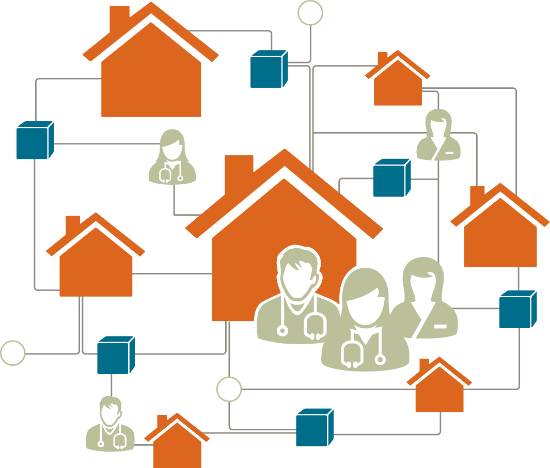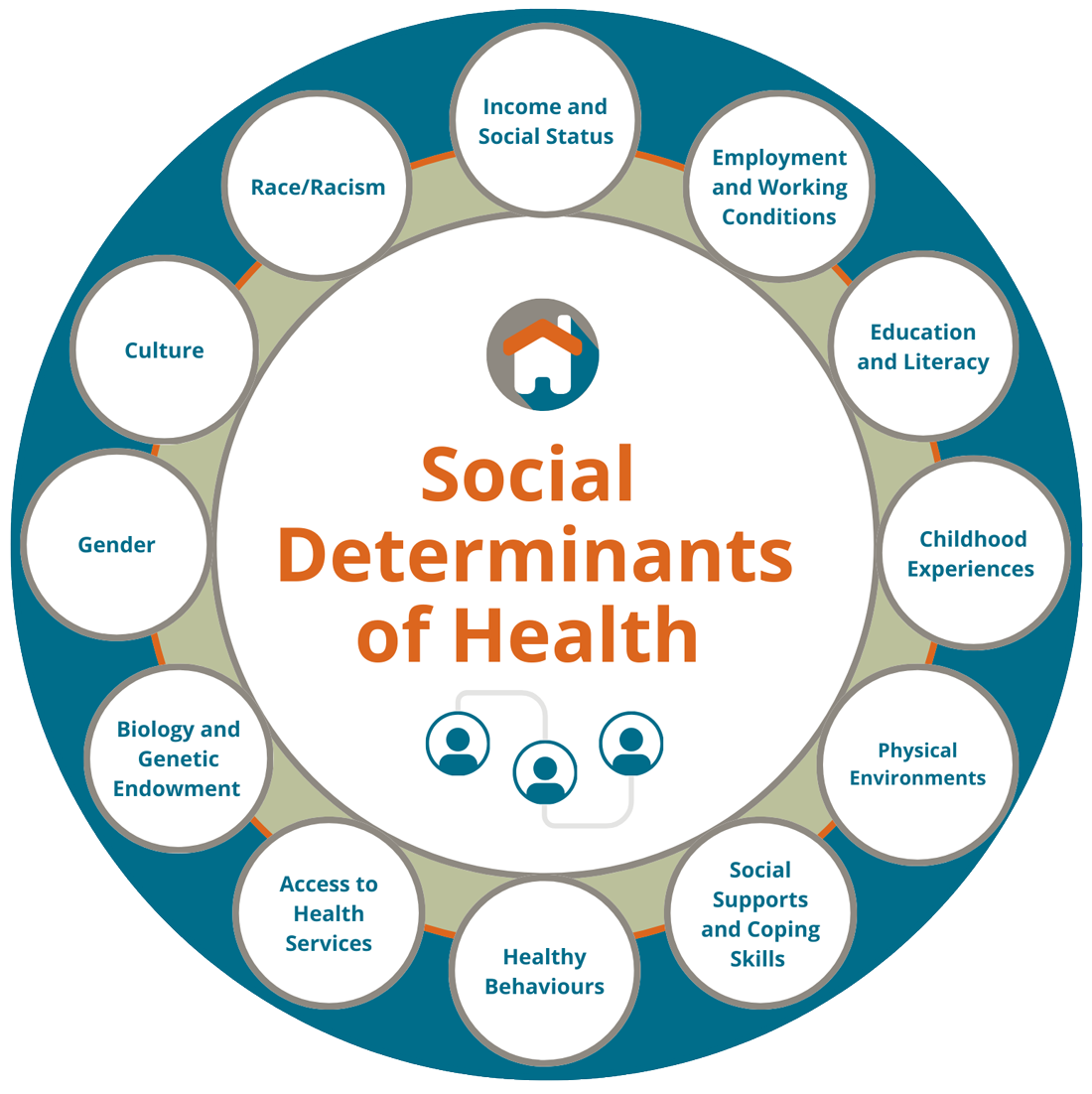What is a Primary Care Network?
A Primary Care Network (PCN) is a geographic region with clinical resources and a team of allied health professionals to support family physicians and nurse practitioners within that region. South Island is one of the province’s first communities to adopt the PCN health care model, and residents have access to MSP-funded care from a wide range of PCN clinicians as part of their care team. Patients can access these services by referral, or in some cases, allied health professionals practice within the primary care clinic in a co-located arrangement. A key activity of the Primary Care Network is to support primary care clinics to become Patient Medical Homes (PMHs).
The South Island has established three PCNs: Saanich Peninsula, Western Communities and the Salt Spring Island PCN is currently in the service planning stage. These networks allow primary care providers to connect members of a patient’s Care Team in a coordinated way so that everyone works together toward the patient’s health goals.
The BC Ministry of Health and Doctors of BC funds the South Island Primary Care Networks, which is a partnership between the South Island Division of Family Practice, Island Health, First Nations Health Authority, and nine local First Nation communities.
The collaborative team-based care model allows members of each team to:
-
Focus more resources on preventative care
-
Provide disease management and counselling while arranging for follow-up services in the community
-
Increase supports for patients with complex and chronic health conditions
-
Leverage their abilities while supporting and relying on each other to provide the best care for patients
-
Expand South Island's capacity to attached patients to a family physician or nurse practitioner
What is a Patient Medical Home?
The concept of a Patient Medical Home (PMH) represents a transformative approach to primary healthcare that is gaining momentum in British Columbia. It is a centralized setting where patients receive a spectrum of coordinated and comprehensive health services.
The PMH aims to provide a seamless patient experience by ensuring that care is not only focused on immediate health concerns, but also on long-term wellness and prevention strategies. With its focus on team-based care, the PMH model encourages collaboration among healthcare professionals, leading to more efficient and effective patient care, ultimately enhancing the overall health outcomes for the community.
We believe that by supporting practices and providers to explore and develop the PMH attributes, we will improve access to quality primary care, and by extension, enhance patient and provider experience of the system.
The Patient Medical Home model emphasizes:
-
The importance of accessibility
-
Patient-centred care
-
Continuity throughout life stages
-
Integration with other health system services

What is different about the Patient Medical Home model?
The Patient Medical Home model is a more holistic approach to primary care that differs from traditional models in several ways.
The Patient Medical Home model:
-
Emphasizes a patient-centred approach, where care is tailored to the full range of patient needs, rather than focusing solely on disease treatment. It involves a personal healthcare provider for every patient, ensuring continuity of care and a strong patient-provider relationship
-
Supports a team-based care system, which includes a variety of healthcare professionals working collaboratively to provide comprehensive services. This contrasts with traditional care, which may be more physician-centric
-
Provides enhanced access to care, offering more flexible hours and communication methods for patients. Additionally, care coordination is a fundamental aspect of the PMH, facilitating the integration of various health services and patient support across the healthcare system
The PMH model incorporates advanced health information technology, such as electronic medical records, to improve care delivery and patient engagement. These elements combine to create a primary care setting that aims to be more responsive to individual patient needs and promote better health outcomes.
What are the benefits of a team-based care model?
Team-based care in the Patient Medical Home model offers numerous benefits that enhance the quality and efficiency of patient care.
Team-based care:
-
Offers improvement in the comprehensiveness and coordination of care, as a diverse group of healthcare professionals collaborate to address the full spectrum of patient needs. This multidisciplinary approach ensures that patients receive more personalized and thorough care.
-
Leads to increased practice efficiency, as tasks are distributed among team members according to their expertise, allowing for a more streamlined patient experience
-
Supports better health outcomes by integrating interventions that cater to the diverse needs of patients, families, and communities
The PMH model incorporates advanced health information technology, such as electronic medical records, to improve care delivery and patient engagement. These elements combine to create a primary care setting that aims to be more responsive to individual patient needs and promote better health outcomes.
It has been observed that well-implemented team-based care can contribute to the quadruple aim of healthcare:
-
Improving patient health
-
Enhancing the patient experience
-
Reducing healthcare costs
-
Improving the work life of healthcare providers and staff
By fostering an environment where all healthcare professionals work towards a common goal, team-based care in a Patient Medical Home creates a more effective and satisfying healthcare delivery system for both patients and the healthcare providers.
How does team-based care address the social determinants of health?
Team-based care is pivotal in addressing social determinants of health by leveraging the diverse expertise of healthcare professionals to tackle the multi-faceted issues that affect patient well-being. This collaborative approach allows for a more comprehensive understanding of the patient’s life context, enabling the identification and addressing of barriers such as food insecurity, housing instability, and economic challenges that can impact health outcomes. By integrating services like social work, nutrition counselling, and behavioral health within the healthcare team, patients receive support that goes beyond traditional medical care.
Team-based care facilitates the development of targeted interventions that can mitigate health disparities, particularly in underserved communities. by fostering a culture of inclusivity and patient advocacy within the healthcare system. The model’s emphasis on communication and shared responsibility among team members ensures that all aspects of a patient’s health, including social and environmental factors, are considered in their care plan.
The social determinants of health are the factors that affect the health and well-being of individuals and communities.
In Canada, the social determinants of health include:

PCN Engagement Opportunities
Contact us to learn more about becoming an active PCN clinic and to find out more information on how to:
- Request access to a PCN Allied Health Care Team
- Participate in PCN Provider Leadership and Advisory Committees
- Lead and participate in PCN projects, working groups, and quality improvement initiatives
- Support network education by sharing Team Based Care successes and become a mentor for others
- Get connected to other professionals in the PCN